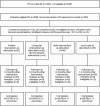Patients and computers as reminders to screen for diabetes in family practice. Randomized-controlled trial
- PMID: 16191138
- PMCID: PMC1490216
- DOI: 10.1111/j.1525-1497.2005.0197.x
Patients and computers as reminders to screen for diabetes in family practice. Randomized-controlled trial
Abstract
Background: In New Zealand, more than 5% of people aged 50 years and older have undiagnosed diabetes; most of them attend family practitioners (FPs) at least once a year.
Objectives: To test the effectiveness of patients or computers as reminders to screen for diabetes in patients attending FPs.
Design: A randomized-controlled trial compared screening rates in 4 intervention arms: patient reminders, computer reminders, both reminders, and usual care. The trial lasted 2 months. The patient reminder was a diabetes risk self-assessment sheet filled in by patients and given to the FP during the consultation. The computer reminder was an icon that flashed only for patients considered eligible for screening.
Participants: One hundred and seven FPs.
Measurements: The primary outcome was whether each eligible patient, who attended during the trial, was or was not tested for blood glucose. Analysis was by intention to treat and allowed for clustering by FP.
Results: Patient reminders (odds ratio [OR] 1.72, 95% confidence interval [CI] 1.21, 2.43), computer reminders (OR 2.55, 1.68, 3.88), and both reminders (OR 1.69, 1.11, 2.59) were all effective compared with usual care. Computer reminders were more effective than patient reminders (OR 1.49, 1.07, 2.07). Patients were more likely to be screened if they visited the FP repeatedly, if patients were non-European, if they were "regular" patients of the practice, and if their FP had a higher screening rate prior to the study.
Conclusions: Patient and computer reminders were effective methods to increase screening for diabetes. However, the effects were not additive.
Figures


References
-
- Kenealy T, Braatvedt G, Scragg R. Screening for type 2 diabetes in non-pregnant adults in New Zealand: practical recommendations. N Z Med J. 2002;115:194–6. - PubMed
-
- Ministry of Health. Taking the Pulse: The 1996/97 New Zealand Health Survey. Wellington: Ministry of Health; 1999.
-
- Johnston M, Langton K, Haynes B, Mathieu A. Effects of computer-based clinical decision support systems on clinician performance and patient outcome; a critical appraisal of research. Ann Intern Med. 1994;120:135–42. - PubMed
-
- Larme A, Pugh J. Attitudes of primary care providers toward diabetes: barriers to guideline implementation. Diabetes Care. 1998;21:1391–6. - PubMed
Publication types
MeSH terms
LinkOut - more resources
Full Text Sources
Medical
Miscellaneous
